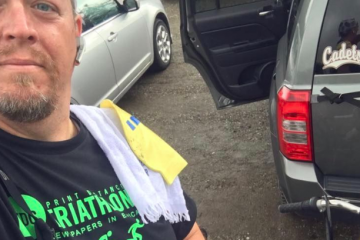Visiting funerals: part of your job description?
 I am a relationship manager and I really like my job. One thing I like about it is the diversity: you meet a wide variety of people. Interesting people. People you would otherwise not meet. This can be the CEO of a large, global company, but it can also be a young owner of a creative start-up. And it can be an 80-year old founder of a large family business, but this can also be a 30-some year old multimillionaire.
I am a relationship manager and I really like my job. One thing I like about it is the diversity: you meet a wide variety of people. Interesting people. People you would otherwise not meet. This can be the CEO of a large, global company, but it can also be a young owner of a creative start-up. And it can be an 80-year old founder of a large family business, but this can also be a 30-some year old multimillionaire.
Another part of this variety is the fact that you meet these people in different settings, and that you have various types of meetings: thank-you meetings for a spontaneous donation, creative brainstorm meetings, prospecting meetings where you have to give everything in you to secure their support, etc.
Last Monday I had a different type of meeting, joining a colleague of mine. She is a new relationship manager in our team and she focuses on legacies & inheritances. This would be her first meeting for MSF, so we decided that I would join her, because of my experience. And there I was; sitting on a couch next to a crying woman who told me she would not live to see the end of the year. But it was also a nice visit. I told about our organization and our different projects. I told about our mother-and-child care activities, and we concluded that the end of one person might mean the start of a new one. And this was beautiful and we all said goodbye with a big smile on our faces.
Later that day I was called by one of my major corporate donors. This company has been donating for ages, and quite a bit too. I have met the director (also a large donor on personal title) on different occasions. He visited several of our major donor events, and more recently he had invited me to the opening of his new building site, which I gladly accepted. But now it was one of his employees calling me. I presumed he called on behalf of the director, wanting to discuss something. Unfortunately I presumed wrong. He called on behalf of the wife of the director. Or actually, I should say widow, as the director had unexpectedly died that Saturday. He was just 48 years old, had a wife, two kids, and both of his parents were still living. I was extremely shocked and with goose bumps on my arms I listened to the story about what had happened. He also told me that the wife of the director (whom I met several times as well), had asked him to inform me personally and to invite me to the funeral. I was honored to hear this, especially when he told me there weren’t too many business relations invited. So of course I went, which was earlier today.
And it was sad day. He was lying there in an open coffin and family members were standing in a line to be condoled with. I was saddened when I looked his wife into her eyes, and I could hardly control my tears when I passed my condolences to his crying old mother. Standing next to her was his crying father, who didn’t look anybody in the eyes, as he just kept staring to the ground. But it was good that I had gone and that I could personally pay my respect.
This was not the first funeral of a donor I went to. Some years back the founder of our largest corporate donor had passed away. He had given some extremely large donations and I had met him on various occasions. So when he passed away I didn’t have the slightest doubt whether or not I should accept their invitation to come to the funeral. And the fact that I had to give up a whole weekend day (the funeral was on a Saturday and I had to travel as far as you could go in Holland), didn’t make me doubt at all. And the fact that a good friend of mine had turned 30 and gave a big party the night before wasn’t ideal, but it didn’t make me doubt either.
 I went with my line manager and we were both glad that we had gone. We were also both surprised (to put it mildly) that we later heard that we were the only charity present on the funeral, while we know that this company also generously supported various other charities. Perhaps I shouldn’t judge the decisions of those other charities, but I can’t help myself. In my opinion his commitment was of such a level that those charities should have been represented.
I went with my line manager and we were both glad that we had gone. We were also both surprised (to put it mildly) that we later heard that we were the only charity present on the funeral, while we know that this company also generously supported various other charities. Perhaps I shouldn’t judge the decisions of those other charities, but I can’t help myself. In my opinion his commitment was of such a level that those charities should have been represented.
Not that I needed it, but I was later confirmed that my decision to go was right. Not by the fact that his children are continuing his support to us (with even larger donations than their father had given), but by the fact that his children had both told me, with full emotion, how glad they were that we had attended.
But to me this is just normal; part of the job as a relationship manager. But also part of being a decent person. I guess a good relationship manager is passionate about the work of his organization, but also about his donors. Amen.



1 Comment
Dan Blakemore · August 1, 2012 at 16:15
Gerben,
Thanks for this insightful post! The centrality of relationship management to our work as fundraisers is something about which we always need to be reminded. Visiting funerals is not usually in our job descriptions, but doing these sort of small and thoughtful things help deepen donor relationships.